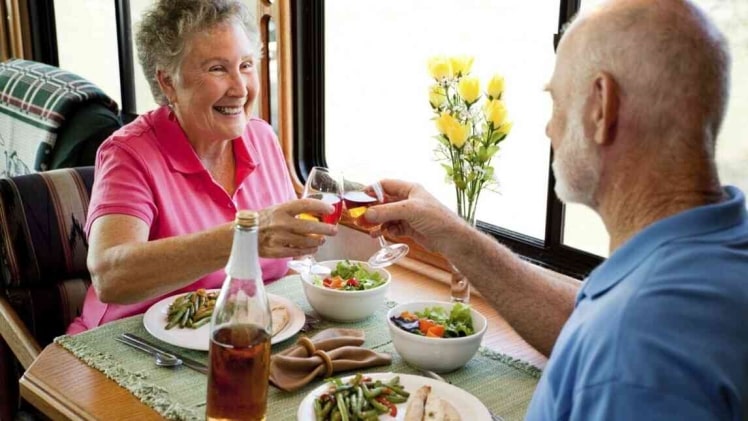As people age, they often face new challenges when it comes to their health. One of the most important things you can do to stay healthy as you age is to eat a nutritious diet.
However, this can be difficult if you don’t have access to fresh, healthy food or if you can’t cook for yourself. It’s important to know how to promote healthy eating habits in the elderly so that they can enjoy a high quality of life. Here are some tips on how to do just that.
The importance of good nutrition for seniors
Proper nutrition is an integral part of a senior’s long-term care plan.
As people age, their nutritional needs often change as well. It can be difficult for seniors to maintain optimal eating habits due to a variety of factors, such as lack of appetite, difficulty shopping and preparing meals, medication interactions, or limited dietary options. Without proper nourishment, seniors are at risk of developing illnesses and other health complications.
As part of home care for seniors, it is important to keep a close eye on what they eat to make sure they get the right balance of macronutrients for good health and longevity.
Good nutrition can help maintain energy levels, promote a healthy level of physical activity, bolster immunity, enhance sleep quality, and provide better overall wellness for a rewarding life at any age.
The challenges of promoting healthy eating habits in seniors
Many older people’s health and nutrition go hand in hand, but it can be hard to eat well and stay healthy.
Many elderly individuals face difficulty with meal preparation, especially if they live alone and are unable to shop and cook due to physical constraints or lack access to nutritious ingredients. Additionally, some seniors cannot afford nutritious food or find it more appealing and convenient to eat pre-processed options that are often low in nutrients.
Promoting healthy eating habits among seniors requires effective strategies that encourage proper nutrition while taking into account any mental or physical limitations of the individual. As a result, home care for seniors is an important component of promoting good nutrition and providing support for those who live alone.
Tips for promoting healthy eating habits in seniors
Getting senior citizens to take steps toward promoting healthy eating habits can be a challenge, especially for senior home care staff. A good place to start is by introducing a balanced diet that includes nutrient-rich fruits and vegetables, whole grains, and lean proteins.
Also, giving seniors choices about what to eat helps them stay in charge of their own diets.
Seniors who help make meals are more likely to think carefully about what they eat, and it can also help them make important social connections in the senior home care community.
The benefits of good nutrition for seniors
Nutrition is one of the most important elements necessary for a healthy life, especially for seniors. Eating right can help improve one’s quality of life, reduce the risks associated with certain diseases, and support physical and cognitive functioning.
In fact, seniors who have a well-balanced and nutritious diet have been shown to have better overall health outcomes than those who don’t. Furthermore, good nutrition can provide important social benefits, as it has been known that interacting with others through meals or enjoying cooking can be an effective way to combat feelings of isolation in seniors.
Senior home care professionals should understand the importance of nutrition by encouraging their clients to make living a healthier lifestyle a priority, whether by shopping for nutrient-rich food items or offering dietary guidance, in order to achieve optimal health benefits.
How important it is to work with a dietitian or nutritionist to help seniors develop healthy eating habits
With the right diet and lifestyle, senior home care recipients can maintain their nutritional health. A dietitian or nutritionist can be a great resource to help seniors make this happen in a sustainable way.
Eating habits that are specific to the individual, along with age and health conditions, must be taken into account when it comes to promoting healthy eating for seniors. If you go to a knowledgeable practitioner first, you won’t have to worry about not getting the nutrients you need at meals.
A dietitian or nutritionist can not only give personalized advice based on your senior’s needs, but they may also be able to help you find resources for custom meals and other dietary services.
Establishing healthy eating habits for our elderly loved ones is an important part of quality senior home care, and getting started with the right help is key.
Seniors must eat well. It can keep people independent, reduce falls and fractures, and manage chronic illnesses like diabetes, heart disease, and hypertension. However, decreased appetite, weariness, an impaired sense of taste and smell, drugs that modify appetite or weight, and difficulties preparing meals can make establishing healthy eating habits in seniors difficult.
Seniors can develop healthy eating habits by offering nutritious, easy-to-prepare meals and snacks, celebrating victories (such as weight loss), involving family and friends in meal preparation, and working with a dietician or nutritionist. A good diet for seniors improves overall health, cognitive function, bones and muscles, falls and bone fractures, and chronic conditions including heart disease and stroke.

